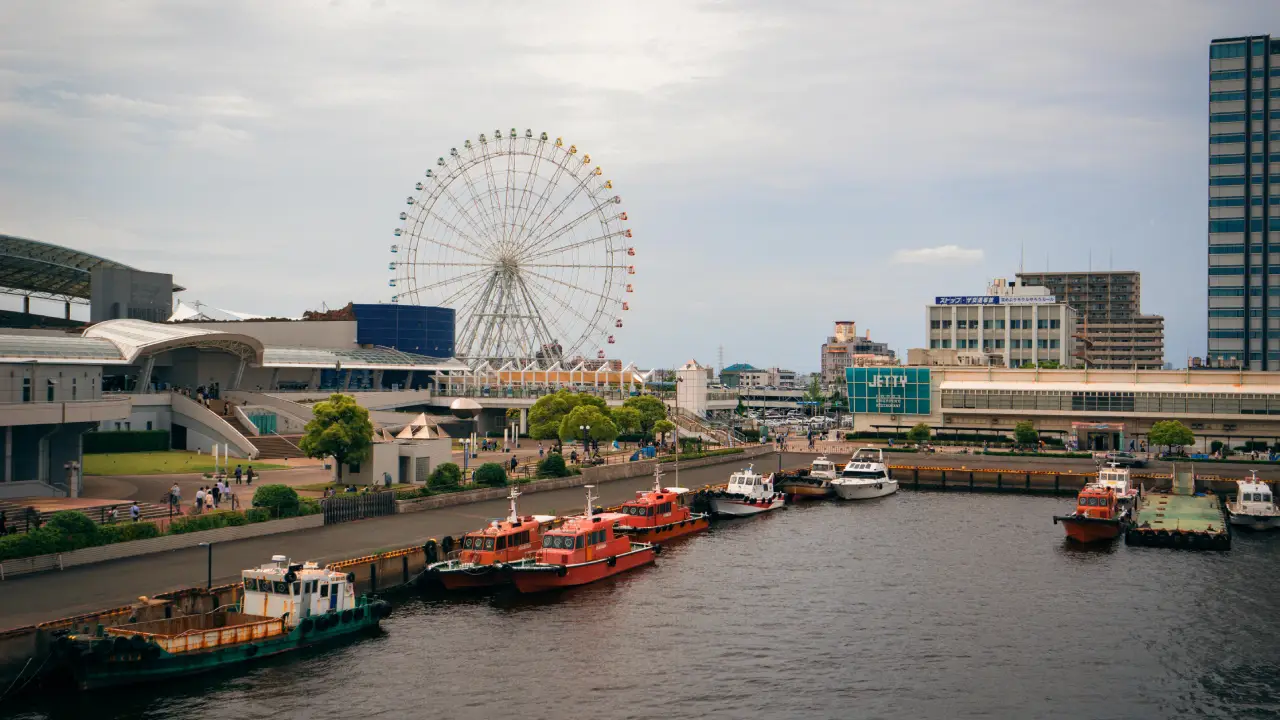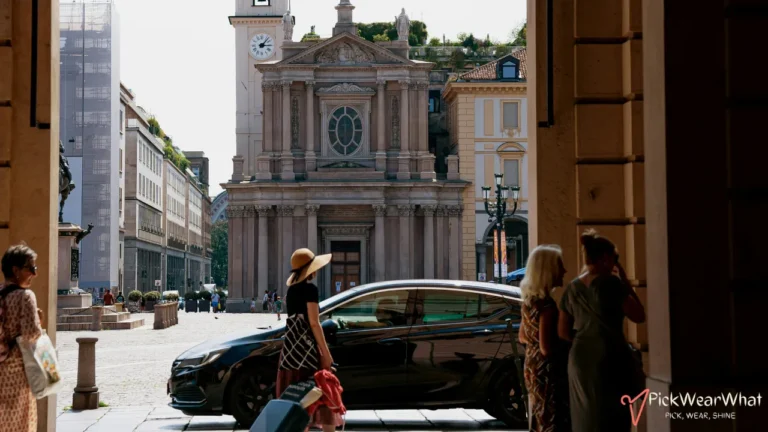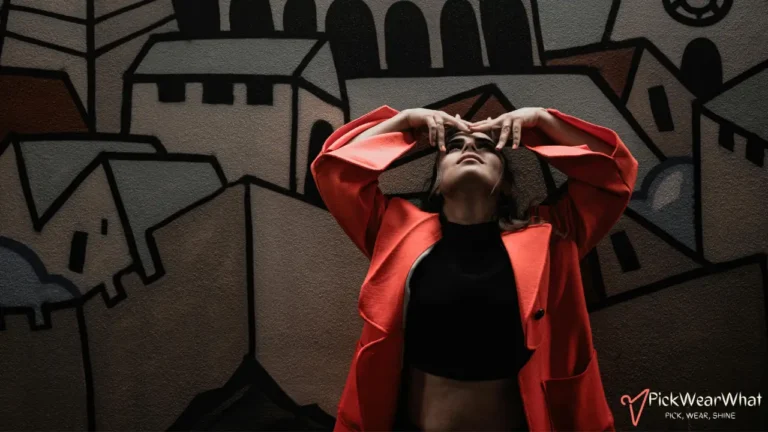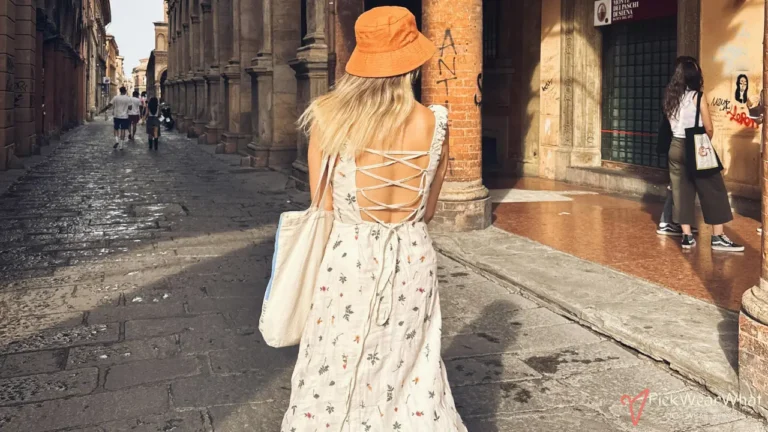What you should wear in Nagoya largely depends on the time of year due to its distinct seasonal changes. In spring (March to May), temperatures are mild, so light jackets or sweaters are appropriate, especially for cooler evenings. Summers (June to August) are hot and humid, making lightweight, breathable clothing essential; consider carrying an umbrella or raincoat during the rainy season in June and July.
Autumn (September to November) brings cooler weather, so layering with long-sleeved shirts and light jackets is advisable. Winters (December to February) can be quite cold, with temperatures occasionally dropping below freezing, so warm coats, scarves, and gloves are necessary. Regardless of the season, comfortable walking shoes are important for exploring the city, and it’s respectful to wear modest attire when visiting temples or traditional sites.
What To Wear in Nagoya by Season?
Planning a trip to Nagoya and wondering what to pack? Nagoya experiences four distinct seasons, each with its own unique weather patterns. Here’s a seasonal guide to help you choose the right clothing for your visit.
Spring in Nagoya (March to May)
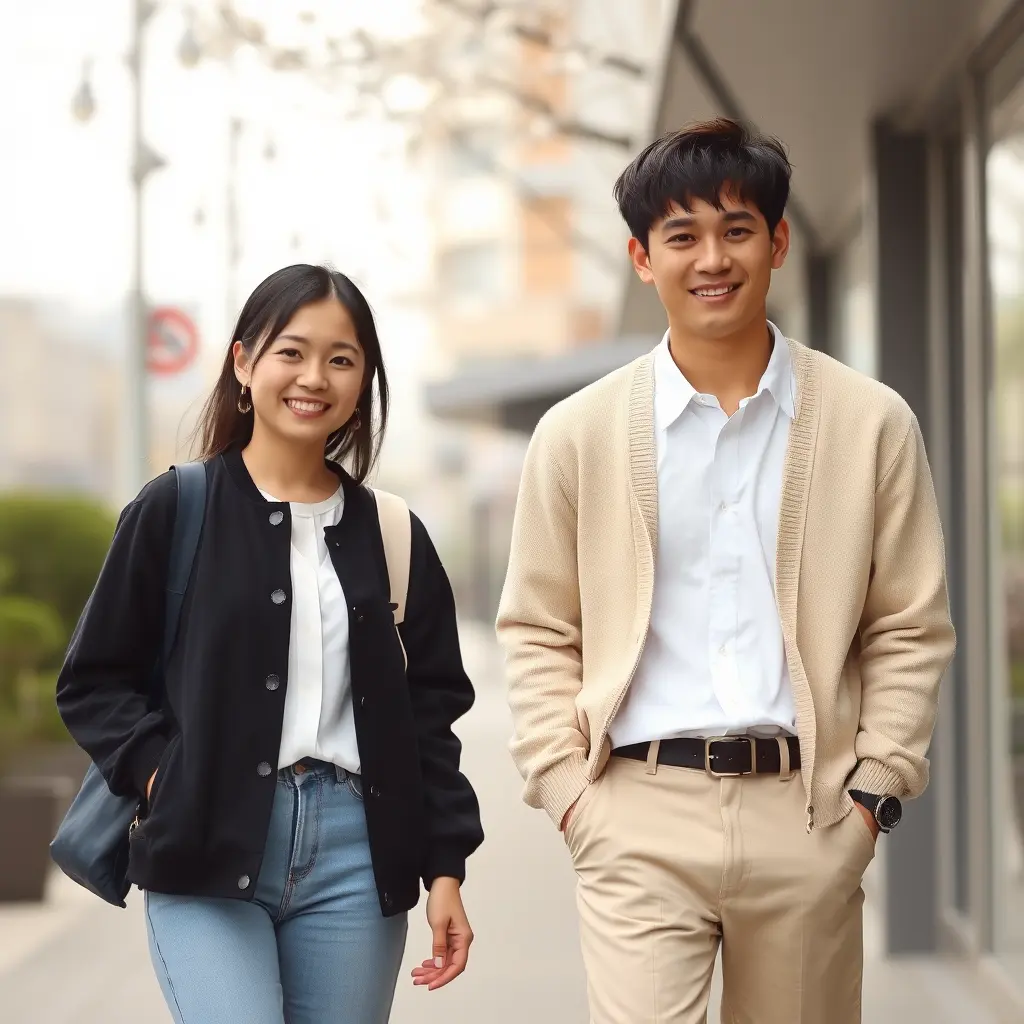
- Weather: Mild temperatures starting around 10°C (50°F) in March and rising to 24°C (75°F) by May. Occasional rainfall is common.
- What to Wear:
- Layers: Light jackets or cardigans for cooler mornings and evenings.
- Tops: Long-sleeved shirts or blouses.
- Bottoms: Jeans or light trousers.
- Footwear: Comfortable walking shoes or sneakers.
- Accessories: A compact umbrella for unexpected showers.
Summer in Nagoya (June to August)
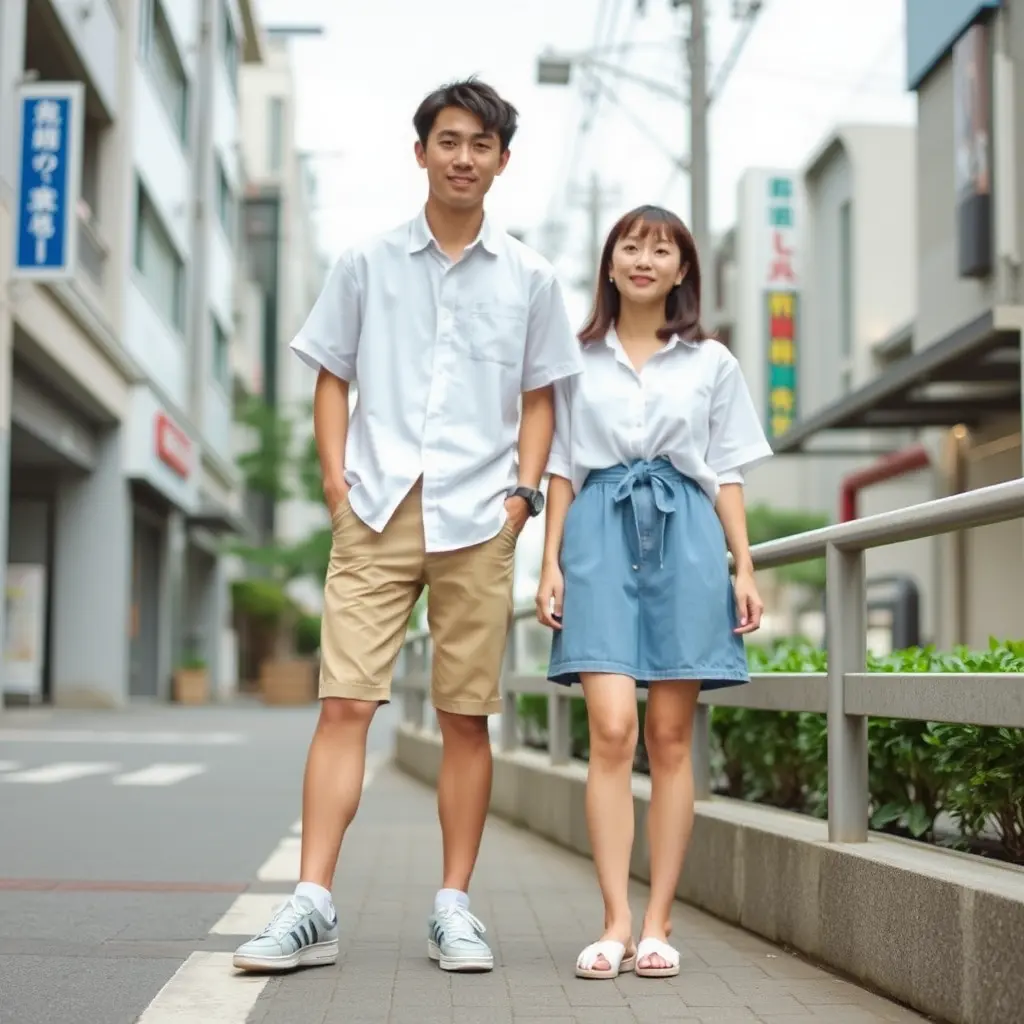
- Weather: Hot and humid with temperatures ranging from 25°C (77°F) to 35°C (95°F). June and July are part of the rainy season (tsuyu).
- What to Wear:
- Tops: Lightweight, breathable fabrics like cotton or linen shirts.
- Bottoms: Shorts, skirts, or light trousers.
- Footwear: Sandals or breathable sneakers.
- Accessories:
- Rain Gear: An umbrella or light raincoat.
- Sun Protection: Hats, sunglasses, and sunscreen.
Autumn in Nagoya (September to November)
- Weather: Cool and comfortable with temperatures decreasing from 20°C (68°F) in September to 10°C (50°F) by November.
- What to Wear:
- Layers: Light jackets, sweaters, or hoodies.
- Tops: Long-sleeved shirts.
- Bottoms: Jeans or chinos.
- Footwear: Closed-toe shoes or boots.
- Accessories: Scarves can add warmth and style.
Planning a trip to Nagoya and wondering what to pack? Nagoya experiences four distinct seasons, each with its own unique weather patterns. Here’s a seasonal guide to help you choose the right clothing for your visit.
Winter in Nagoya (December to February)
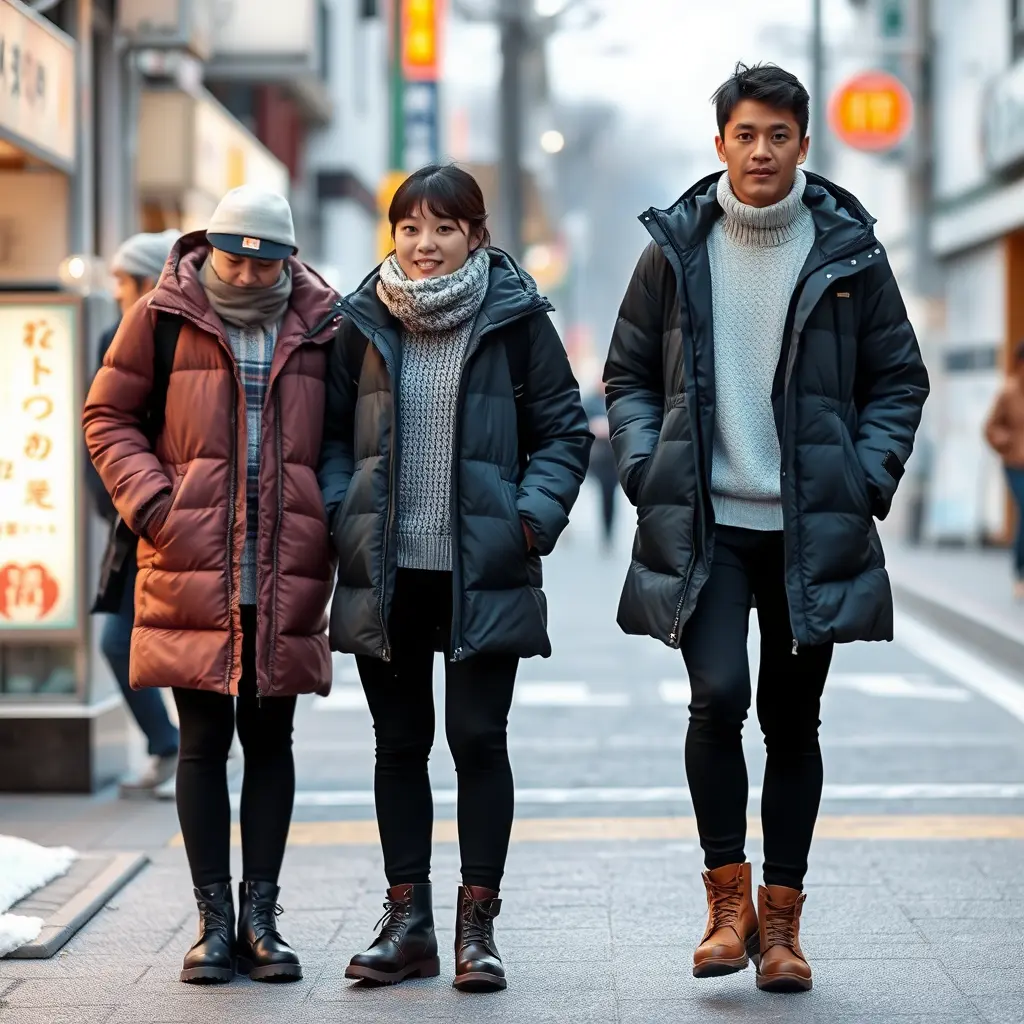
- Weather: Cold with temperatures between 0°C (32°F) and 10°C (50°F). Snow is rare but possible.
- What to Wear:
- Outerwear: Warm coats or down jackets.
- Layers: Thermal shirts and sweaters.
- Bottoms: Thick trousers or thermal leggings.
- Footwear: Boots or insulated shoes.
- Accessories: Gloves, hats, and scarves for added warmth.
Additional Tips
- Comfortable Footwear: Regardless of the season, bring comfortable shoes for walking and public transportation.
- Cultural Considerations: When visiting temples or shrines, opt for modest attire—avoid overly revealing clothing.
- Weather Check: Nagoya’s weather can be unpredictable; it’s wise to check the forecast before your trip.
What to Wear in Nagoya from January to December?
Nagoya, located in central Japan, experiences a temperate climate with four distinct seasons—each offering its own unique weather patterns. From chilly winters to hot and humid summers, dressing appropriately will enhance your comfort whether you’re sightseeing, working, or living in the city. Here’s a month-by-month guide on what to wear in Nagoya for both men and women.
| Month | Weather Conditions | What to Wear in Nagoya |
|---|---|---|
| January | Cold, dry, and sometimes snowy | – Heavy coat or down jacket – Layered clothing (sweaters, thermals) – Scarves, gloves, and hats – Warm boots or insulated shoes |
| February | Cold with some snowfall | – Heavy coat or down jacket – Thermal layers – Warm scarves, gloves, and hats – Boots or winter shoes |
| March | Cool, transitioning to spring | – Light coat or jacket – Long-sleeved shirts and sweaters – Comfortable shoes – Layered clothing as temperatures fluctuate |
| April | Mild and pleasant, early spring blossoms | – Light jacket or cardigan – Long-sleeved shirts – Comfortable walking shoes – Scarves for cooler mornings/evenings |
| May | Warm and sunny, early summer | – Light clothing (T-shirts, blouses) – Light jackets for evenings – Comfortable sneakers or sandals – Sunglasses and sun protection |
| June | Warm and rainy, start of the rainy season | – Light, breathable clothing – Raincoat or umbrella – Waterproof shoes or sandals – Avoid heavy fabrics |
| July | Hot and humid, peak of summer | – Light, breathable fabrics (cotton, linen) – T-shirts, shorts, or skirts – Sandals – Sunhat and sunglasses – Light raincoat for summer showers |
| August | Very hot and humid | – Lightweight, loose-fitting clothing – Breathable fabrics (cotton, linen) – Sunhat, sunglasses, and sunscreen – Open-toe shoes or sandals |
| September | Warm and humid, typhoon season | – Light clothing with rain gear – Waterproof shoes – Umbrella and light raincoat – Short-sleeved shirts or blouses |
| October | Mild, pleasant autumn weather | – Light jackets or cardigans – Long-sleeved shirts – Comfortable walking shoes – Layering is key for fluctuating temperatures |
| November | Cool, with colorful autumn foliage | – Light to medium jacket – Sweaters or long-sleeved shirts – Comfortable shoes or boots – Scarves for added warmth |
| December | Cold, dry, with occasional snow | – Winter coat or padded jacket – Layered clothing (sweaters, thermals) – Gloves, hats, and scarves – Warm boots or insulated shoes |
What to Wear in Nagoya in January?
January is one of the coldest months in Nagoya, with temperatures ranging from 0°C to 9°C (32°F to 48°F). Expect cold days and nights, with occasional snowfall.
For Men:
- Heavy coats or insulated jackets
- Sweaters or thermal tops
- Long-sleeved shirts
- Warm trousers or jeans
- Scarves, gloves, and hats
- Warm boots or closed-toe shoes with good grip

For Women:
- Heavy coats or down jackets
- Sweaters or thermal tops
- Long-sleeved blouses
- Warm skirts with thick tights or pants
- Scarves, gloves, and hats
- Warm boots
What to Wear in Nagoya in February?
February remains cold, with temperatures similar to January. Layering is key to staying warm.
For Men:
- Insulated jackets or overcoats
- Thermal wear
- Long-sleeved shirts
- Jeans or wool trousers
- Winter accessories (scarves, gloves, hats)
- Waterproof boots
For Women:
- Warm coats or parkas
- Thermal layers
- Long-sleeved tops
- Skirts with thermal leggings or pants
- Winter accessories
- Waterproof boots
What to Wear in Nagoya in March?
March signals the beginning of spring, but temperatures are still cool, ranging from 4°C to 13°C (39°F to 55°F).
For Men:
- Light to medium-weight jackets
- Sweaters or cardigans
- Long-sleeved shirts
- Jeans or chinos
- Light scarves
For Women:
- Trench coats or light jackets
- Cardigans or light sweaters
- Long-sleeved blouses
- Skirts with tights or pants
- Closed-toe shoes
What to Wear in Nagoya in April?
April brings milder weather and the famous cherry blossoms. Temperatures range from 9°C to 18°C (48°F to 64°F).
For Men:
- Light jackets or blazers
- Long-sleeved or short-sleeved shirts
- Jeans or light trousers
- Comfortable walking shoes
For Women:
- Light jackets or cardigans
- Dresses with light layering
- Skirts or pants
- Comfortable flats or sneakers
What to Wear in Nagoya in May?
May offers pleasant warmth with temperatures between 14°C and 23°C (57°F to 73°F).
For Men:
- Short-sleeved shirts or polos
- Light trousers or jeans
- Optional light sweater for evenings
- Loafers or casual shoes
For Women:
- Blouses or light tops
- Skirts, dresses, or light pants
- Light cardigans
- Comfortable sandals or flats
What to Wear in Nagoya in June?
June marks the beginning of the rainy season (tsuyu), with increased humidity and temperatures from 19°C to 26°C (66°F to 79°F).
For Men:
- Breathable, quick-dry shirts
- Light trousers or shorts
- Waterproof jacket or umbrella
- Waterproof shoes or sandals
For Women:
- Light dresses or tops
- Skirts or shorts
- Waterproof outerwear
- Waterproof footwear
What to Wear in Nagoya in July?
July is hot and humid, with temperatures ranging from 23°C to 30°C (73°F to 86°F).
For Men:
- Short-sleeved shirts or T-shirts
- Shorts or lightweight pants
- Breathable fabrics like cotton or linen
- Sandals or airy shoes
- Sun hat and sunglasses
For Women:
- Light dresses, skirts, or shorts
- Breathable tops
- Sandals
- Sun hat and sunglasses
What to Wear in Nagoya in August?
August continues the hot and humid trend, with temperatures between 24°C and 32°C (75°F to 90°F).
For Men:
- Lightweight, short-sleeved shirts
- Shorts or thin trousers
- Open-toe sandals or breathable shoes
- Sun protection (hat, sunglasses)
For Women:
- Summer dresses or light outfits
- Open-toe footwear
- Sun protection accessories
What to Wear in Nagoya in September?
September starts to cool down slightly but remains warm, ranging from 20°C to 28°C (68°F to 82°F). Be prepared for occasional typhoons.
For Men:
- Light shirts
- Trousers or shorts
- Light rain jacket or umbrella
- Waterproof footwear
For Women:
- Light tops and blouses
- Skirts or pants
- Rain-ready outerwear
- Waterproof shoes
What to Wear in Nagoya in October?
October brings comfortable autumn weather, with temperatures from 13°C to 22°C (55°F to 72°F).
For Men:
- Long-sleeved shirts
- Light sweaters or jackets
- Jeans or chinos
- Comfortable sneakers or shoes
For Women:
- Long-sleeved dresses or tops
- Cardigans or light jackets
- Skirts with tights or pants
- Ankle boots or flats
What to Wear in Nagoya in November?
November is cooler, and autumn foliage is at its peak. Temperatures range between 7°C and 16°C (45°F to 61°F).
For Men:
- Medium-weight coats or jackets
- Sweaters
- Long-sleeved shirts
- Warm trousers
- Closed-toe shoes
For Women:
- Coats or heavy cardigans
- Sweaters
- Dresses with tights or pants
- Boots or warm flats
What to Wear in Nagoya in December?
December ushers in the winter season, with temperatures dropping to 2°C to 11°C (36°F to 52°F).
For Men:
- Heavy coats or parkas
- Thermal wear
- Sweaters
- Scarves, gloves, and hats
- Warm boots
For Women:
- Warm coats or down jackets
- Thermal layers
- Sweaters or knitwear
- Winter accessories
- Warm boots
What to Wear in Nagoya for Different Activities?
With distinct seasons and a range of activities, choosing the right attire can enhance your experience. Here’s a guide on what to wear for different activities in Nagoya, ensuring you’re comfortable and stylish while exploring this vibrant city.
1. Sightseeing at Nagoya Castle
Visiting Nagoya Castle is a must for anyone in the city. Since this involves walking around historic sites and gardens, it’s best to prioritize comfort:
- Spring/Summer: Light, breathable fabrics like cotton or linen, paired with comfortable walking shoes. A sun hat or sunglasses can protect you from the sun.
- Fall/Winter: A warm jacket or coat, along with a scarf and gloves for colder days. Comfortable, insulated boots are ideal as the castle grounds can get chilly.
2. Exploring Osu Shopping District
Osu is a lively shopping area where you can find everything from traditional goods to trendy fashion. Since you’ll be walking and browsing through markets and stores, a casual yet stylish look works well:
- All-Year Round: Opt for a smart-casual outfit like jeans and a nice top. Comfortable sneakers or stylish flats are best for navigating the streets. Layering is key, as you may go indoors and outdoors frequently.
- Rainy Days: Carry a lightweight rain jacket or umbrella during the rainy season (usually in June and July).
3. Dining at a Traditional Japanese Restaurant
Nagoya is famous for its culinary delights like miso katsu and hitsumabushi. Dining at a traditional restaurant can be a cultural experience, so dressing respectfully is important:
- Casual Dining: For casual eateries, a neat, smart-casual outfit works perfectly. A comfortable dress or trousers with a blouse or button-down shirt will make you feel appropriately dressed.
- Formal Dining: For high-end restaurants, a semi-formal look is recommended. Men can wear slacks with a blazer, while women might choose a chic dress or skirt.
4. Attending a Festival
Nagoya hosts various festivals, like the Nagoya Matsuri in autumn. Depending on the time of year, festival attire can vary, but comfort and style are key:
- Summer Festivals: Lightweight, breathable clothing such as a yukata (a casual summer kimono) is ideal for the hot weather. If you’re not wearing a yukata, a light summer dress or shorts with a t-shirt will keep you cool.
- Fall Festivals: Opt for layers like a cardigan or light jacket with jeans and comfortable shoes, as you’ll likely be on your feet for hours.
5. A Day Trip to Atsuta Shrine
A visit to Atsuta Shrine, one of Japan’s most important Shinto shrines, requires respectful attire. Modesty is key when visiting religious sites:
- All-Year Round: Wear clothing that covers your shoulders and knees, such as a longer skirt or pants with a conservative top. Avoid overly casual attire like shorts or tank tops. A comfortable pair of shoes is recommended for walking around the shrine grounds.
6. Exploring Toyota Commemorative Museum of Industry and Technology
Nagoya is the birthplace of Toyota, and this museum offers a fascinating look into Japan’s industrial and technological history. Since the museum is indoors, you’ll want to dress comfortably for a day of exploration:
- All-Year Round: Smart-casual attire, such as jeans or slacks with a nice top, is appropriate. Since the museum is well-air-conditioned, a light sweater or jacket might be needed in cooler months. Comfortable shoes are a must for walking through the exhibits.
7. Nightlife in Sakae
Nagoya’s Sakae district is the city’s entertainment hub, with plenty of bars, clubs, and restaurants to explore. For a night out, you’ll want to look your best:
- Evening Outfits: Dress to impress with chic evening wear. For women, a stylish dress or jumpsuit paired with heels or ankle boots is perfect for a night out. Men can opt for smart-casual attire like fitted trousers and a collared shirt. Bring a light jacket if it’s a cooler evening.
You Can Also Read:
FAQs On What To Wear in Nagoya
Summers in Nagoya can be hot and humid, so lightweight, breathable fabrics like cotton or linen are ideal. Shorts, skirts, or light dresses paired with comfortable sandals or sneakers are great choices.
Comfortable walking shoes are essential, especially for exploring attractions like Nagoya Castle, Osu Shopping District, and shrines. Opt for sneakers or cushioned flats.
Dress modestly when visiting religious sites like Atsuta Shrine. Avoid sleeveless tops, shorts, or revealing clothing.
For casual dining, smart-casual outfits such as neat jeans and a nice top are fine. If you plan to dine at a more upscale restaurant, semi-formal attire is recommended.

